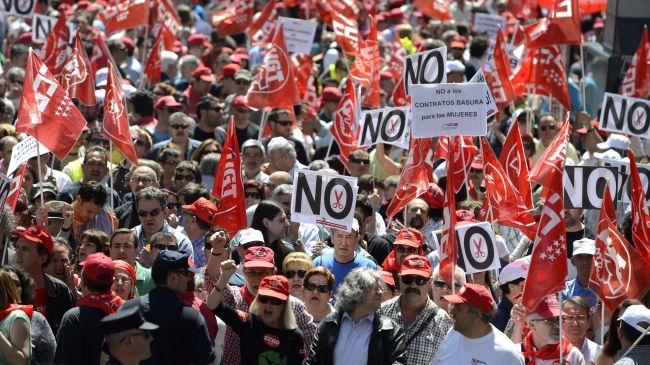Democrat May-June 2012 (No.129)
Germany at a crossroads
The eurozone crisis by Brian Denny

The EU is once more exploiting the growing crisis in the Eurozone by demanding more financial centralisation through a Banking Union which would involve member states giving up control of its banks to a central EU authority.
Demonstrations in Spain against bank bailout and austerity policies the day after the £81 billion bailout was announced
The latest EU proposals were made just prior to a £81 billion (that's 81,000,000,000 pounds) bail out of the Spanish banking sector. Spain does not have to endure the same humiliating bail-out conditions as Greece, Ireland and Portugal because it is a bigger fish and German self-interest demands a quick resolution with the least political fall-out as possible.
Much of the Spanish banks bad debt is held by publicly-owned German Sparkassen banks and German regional Landesbanks. These banks have pumped billions into sub-prime mortgage securities in the US and massively contributed to the property bubble across Europe. German banks are owed twice as much by banks in the other three bailed-out countries as they are by governments. Moreover, German banks have an exposure to Spain that is about three quarters as great as it is to the other three countries combined. In short, this is another bail-out for German banks, not the indebted countries.
As the Irish commentator Richard Whelan has pointed out: "Germany now has undue influence and control over the weakened economies of a growing number of states in Europe.
"This outcome deserves the description of 'neo-colonialism', perhaps best understood as the workings of a neo-colonial mindset,"* he wrote.
However the European Union's new directive on resolving failed banks that would constitute a "banking union," has already run into a storm of German and British disapproval.
Although the UK's David Cameron and Germany's Angela Merkel support further financial centralisation within the Eurozone, both countries elites are resisting a banking union.
While Berlin is fond of removing democratic sovereign rights from other member states it is even more keen on running its own banks for its own political ends.
German bank associations took immediate exception to the draft directive, arguing it unfairly exposed their depositors to risks in weaker banks elsewhere.
"German banks would have no influence over the risks that were taken on in other European banking systems, and should therefore not be liable for them," said Gerhard Hofmann, head of the Federal Association of Cooperative Banks.
Moreover British finance capital will not give up control of its banks to a central EU authority and The European Banking Authority, which would oversee a Banking Union is in the wrong place for the federalists, London.
To date, German media has falsely portrayed the Eurozone crisis as the result of Greeks being 'lazy' and Italians being 'corrupt'. But the reality is that Germany has been exporting capital to ensure the survival of its export-led economy. Today Germany is the only EU country with economic growth while so-called periphery countries are drowning in debt and can never compete locked in a single currency not designed for them. Now Germans are being asked to pay for their empire and it is not clear whether public opinion or banking elites will go along with it.
Germany is stuck and has to decide what path to take it has to decide either to walk away or go for a full blown Empire. Whatever Germany decides it will decide the future of Europe for the third time in 100 years.
*Merkel's Folly: Germany's economic neo-colonialism, Studies: An Irish Quarterly Review Autumn 2011,Richard Whelan